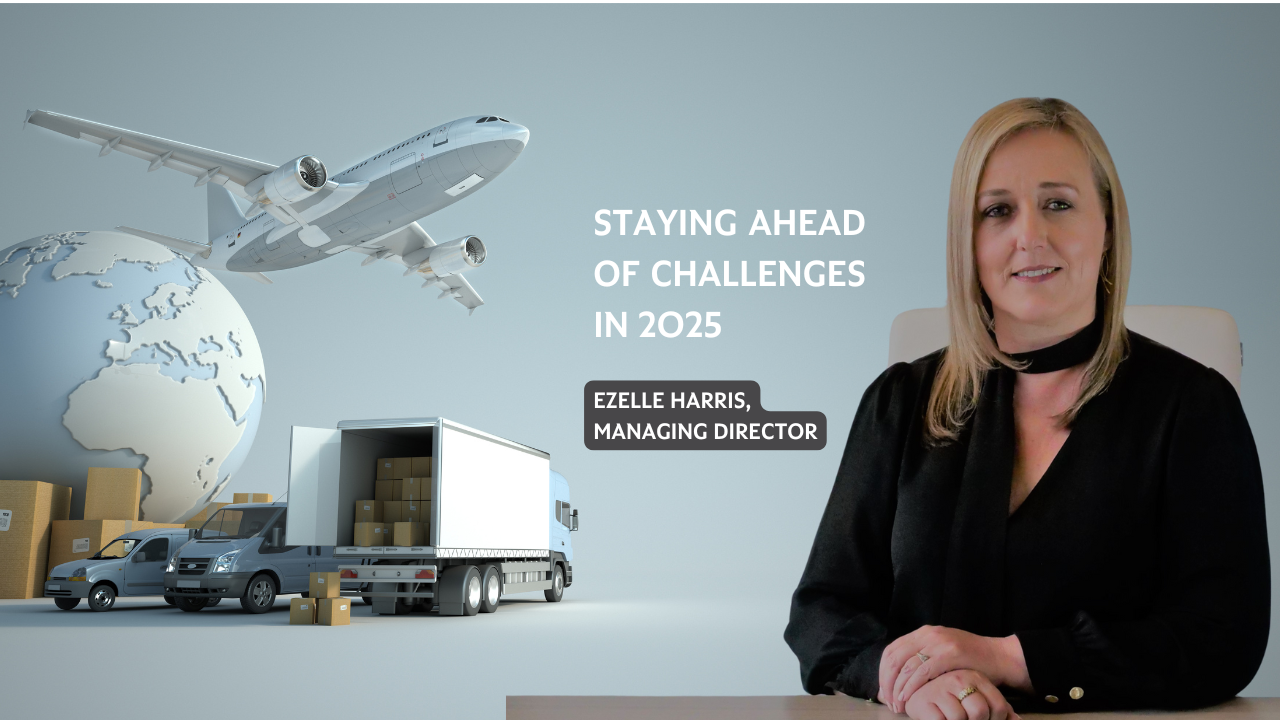Key Challenges That Will Shape the Logistics Industry in 2025
The logistics industry is evolving rapidly, driven by shifting global trends, emerging technologies, and an increasing emphasis on sustainability. We chatted to Ezelle Harris, Managing Director of Seabourne Logistics in South Africa about her view of the logistics landscape for 2025, the challenges expected and how Seabourne Logistics are gearing up to navigate these changes effectively.
1. Sustainability and Green Logistics
Sustainability is no longer a buzzword but a necessity for the logistics industry. Governments and businesses alike are under pressure to reduce their carbon footprints and operate more environmentally friendly. In 2025, the demand for greener logistics solutions will continue to rise, with more focus on sustainable transport options, energy-efficient warehousing, and eco-friendly packaging.
How Seabourne is preparing: We are actively exploring green transportation alternatives and optimising delivery routes to reduce emissions. Our goal is to balance operational efficiency with sustainability, providing our clients with eco-conscious logistics solutions that also meet their business needs.
2. Digital Transformation and Automation
Technology will continue to reshape logistics in 2025, with digital transformation and automation being at the forefront. Technologies such as artificial intelligence (AI), the Internet of Things (IoT), and robotics will streamline operations, improve delivery speeds, and enhance customer experience. However, adopting these technologies comes with challenges such as high initial investment, integration complexities, and training the workforce to adapt.
How Seabourne is preparing: We are already integrating advanced technologies into our operations, from real-time tracking systems to automated warehousing solutions. These innovations are designed to enhance efficiency, accuracy, and customer satisfaction while reducing the margin for error.
3. Rising Fuel Costs and Inflation
Global economic trends, including inflation and rising fuel costs, are expected to remain a significant challenge for the logistics sector in 2025. These factors directly impact the cost of transportation, warehousing, and overall supply chain management. Logistics companies will need to find innovative ways to manage costs without compromising service quality.
How Seabourne is preparing: We continuously monitor fuel prices and other economic indicators to adjust our pricing and operational strategies accordingly. By optimising routes, investing in fuel-efficient vehicles, and leveraging data analytics, we strive to mitigate cost increases while maintaining competitive pricing for our clients.
4. Workforce Shortages and Skill Gaps
The logistics industry is facing a growing workforce challenge, with shortages of drivers, warehouse workers, and skilled professionals becoming more pronounced. By 2025, the gap between demand for skilled labour and supply may widen further, exacerbated by the rapid pace of technological advancement, which requires a tech-savvy workforce.
How Seabourne is preparing: We’re committed to attracting and retaining top talent by offering continuous training, upskilling opportunities, and fostering a positive work environment. We understand that our people are our greatest asset, and we are investing in both technology and talent to meet the future challenges head-on.
5. Supply Chain Disruptions and Resilience
The COVID-19 pandemic highlighted vulnerabilities in global supply chains, and the effects will continue to influence logistics into 2025. Events such as geopolitical instability, natural disasters, and pandemics will likely cause further disruptions. Businesses will need to build more resilient, agile supply chains to weather these challenges.
How Seabourne is preparing: We are focusing on enhancing supply chain visibility and agility by leveraging technology and establishing strategic partnerships. Our goal is to ensure we can adapt quickly to disruptions, providing reliable services even in unpredictable circumstances.
6. Cross-Border Trade Complexities
As global trade continues to evolve, logistics providers must navigate complex regulatory frameworks, tariffs, and trade agreements, especially in the wake of Brexit and other geopolitical changes. Cross-border logistics will require increased attention to customs compliance, trade policies, and documentation.
How Seabourne is preparing: With extensive experience in international logistics, Seabourne Logistics stays ahead of regulatory changes and ensures that all cross-border operations are smooth and compliant. We offer our clients expert guidance on navigating customs regulations and trade agreements, minimising delays and ensuring seamless international shipping.
7. Customer Expectations and Last-Mile Delivery
As e-commerce continues to boom, customer expectations for fast, flexible, and reliable delivery are rising. Last-mile delivery, which often accounts for the highest cost in the supply chain, will remain a challenge in 2025. Meeting customer demands for same-day or next-day delivery while controlling costs will require significant innovation.
How Seabourne is preparing: Our investment in advanced delivery tracking and route optimisation technology ensures that we meet the high expectations of our customers. We are also exploring partnerships with last-mile delivery specialists and local couriers to extend our reach and improve delivery times.
Looking Ahead: The Road to 2025
The logistics industry is facing a dynamic future filled with both challenges and opportunities. At Seabourne Logistics, we are not just preparing for these changes – we are embracing them. By staying ahead of industry trends, leveraging technology, and investing in our people, we are well-positioned to navigate the challenges of 2025 and continue delivering exceptional service to our clients.
The road ahead may not always be easy, but with the right strategies in place, Seabourne Logistics is ready to lead the way through the evolving landscape of global logistics.
Contact Seabourne Logistics today and let us move your business forward.
011 396 1900 or email connect@seabourne.co.za



